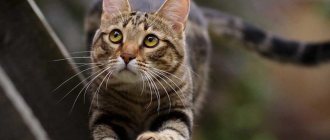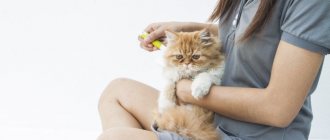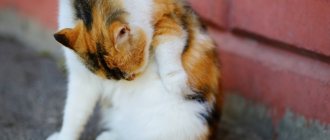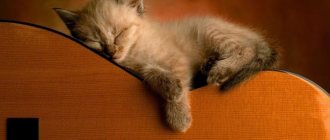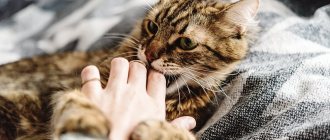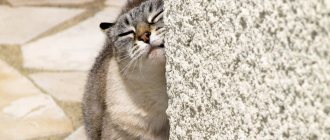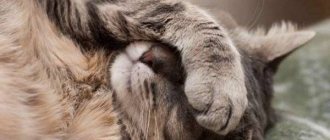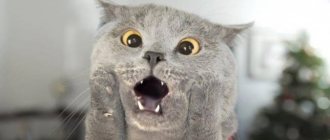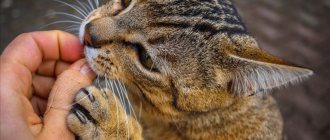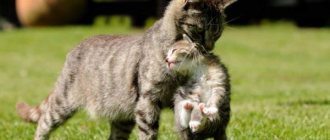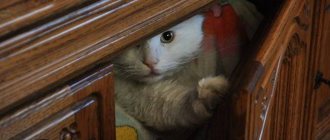Why does a cat grind its teeth?
Sometimes cat owners notice strange behavior of their pet: the cat grinds its teeth, rubs its face with its paw, may refuse to eat or vomit. There may be several reasons why a cat grinds its teeth, and only a veterinarian can accurately determine what is wrong with your pet.
Why does a cat grind its teeth?
Sometimes cat owners notice strange behavior in their animals. The pet is trying to eat, but something seems to be bothering him, he is choking, gritting his teeth, and rubbing his face with his paw. As a rule, when examining and palpating the cat’s oral cavity, owners do not notice anything strange. What could cause such unusual behavior in a cat?
Contrary to the well-known belief that teeth grinding indicates infection with worms, the reason is most often different. Of course, internal intestinal parasites can also cause a cat to grind its teeth, but such cases are quite rare.
The cat chatters its teeth what does it mean | Dental portal
The cat grinds its teeth.
The article discusses the main issues related to many beloved pets, and also pays attention to difficulties with their teeth, which cannot be called a rarity today. Leave your questions in x.
If a cat creaks, a cat clicks its teeth day and night, what does this mean, treatment
There may be several problems: periodontal disease, uremic gastritis. With liver disease, bitterness occurs in the mouth, it bothers the pet and he may grind his teeth and rub his face with his paw. The best thing to do would be to take your pet to the veterinarian for an accurate diagnosis and treatment.
Why does the kitten grind its teeth and not eat anything? What to do?
There can be many problems, ranging from kidney failure to dental problems. Veterinarian consultation required.
Why does a cat grind his teeth while eating?
Check your jaw, see if everything is fine with your teeth and if your gums are inflamed.
There can be many reasons, including diseases of the gastrointestinal tract. Be sure to consult a veterinarian for advice.
Why does a cat grind its teeth when it yawns, when it sleeps, after sterilization, when it eats dry food?
There may be problems with the teeth themselves, or there may be a more serious problem with the pet’s health.
In any case, consultation with a specialist is necessary.
Why do cats use certain sounds?
Why do some cats hardly meow?
Researchers identify 19 different sound “patterns” used by all cats, and each can add its own sounds to its “vocabulary”, which it uses only when communicating with its owner.
Most sounds made by cats fall into three groups: purrs or purrs for greeting, fear and threat sounds such as hisses and growls, and meows.
Cats meow over a wide range of volumes and pitches, depending on the circumstances.
The character of each cat affects its “talkativeness”. Some breeds are noticeably noisier than others, for example, Siamese cats are considered more sociable. Part of talkativeness depends on how much people themselves talk to the cat.
If, when a cat meows, a person answers it or asks what it wants, or the person's actions meet the cat's expectations (the cat receives food or attention), the cat is likely to meow more often.
Cats quickly and easily learn to manipulate their owner using sound signals.
For some cats, the most attractive method of communication is “silent meowing.” In this case, the mouth is open and movements characteristic of ordinary meowing are observed, but no sound is heard. It is assumed that cats actually meow, but the frequency of the sound is too high and inaudible to the human ear.
Why do cats purr?
Rumbling is an unusual sound characteristic of cats, and it is not entirely clear how they produce it. It's not just domestic cats that purr; many species of large felines are also capable of generating vibrations at sound frequencies.
This ability is associated with caring for kittens. When the mother returns to the den and purrs quietly (so as not to attract the attention of predators) she signals that everything is in order, and the kittens, in turn, suckle milk and purr at the same time.
Cats also purr when sick or injured. There are various theories explaining this feature; the frequency of sound in sick animals differs from the frequency of rumbling in healthy ones. It is possible that such purring may have healing properties or serve as a way of self-soothing when the cat feels more vulnerable.
Why do cats click their teeth?
Cats grind and chatter their teeth when they see potential prey but can't reach it, such as a bird outside the window or a fly on the wall. The cat may then run to the window or sit and continue to make strange noises that may indicate frustration, or excitement, or both.
All cat owners have heard these strange and funny sounds made by their pet: they look like chirping or crackling. Experts explained what it all means.
Usually a cat “chirps” (the word does not quite accurately reflect the essence of what is happening, but for lack of a better word we will use it) when it sees a bird outside the window, a squirrel or an insect on the ceiling.
According to veterinarian Erica Loftin, this sound conveys the excitement of a cat that is engrossed in its prey. All cats do this, regardless of breed or size—even wild cats sometimes “chirp.” Sometimes they make this sound when they see food, a toy, or even while “hunting” a person, which, however, happens much less frequently.
Celia Haddon, a feline behaviorist, notes that these sounds can be heard when a cat sees prey but can't reach it. Thus, according to her, the “chirping” can be considered an expression of the overwhelming disappointment experienced by the beast.
When, for example, cats sit on a window, a glass barrier prevents them from completing the entire hunting algorithm - they are stuck at the stage of visual contact with a possible prey, explains Haddon, adding that if a predator suddenly gets a chance to attack the prey, it will take it.
Therefore, she advises keeping cats indoors - it is safe for both wildlife and the cat, The Dodo reports.
Source: https://stomatology-portal.ru/zuby/kot-stuchit-zubami-chto-eto-znachit
Jaw of an adult cat
When the change of teeth in cats is completed, there should be exactly 30 of them in the animal’s oral cavity - this is the normal state of the cat’s jaw. The upper jaw has 6 incisors and 2 canines, 3 premolars on each side and 1 molar. Incisors and canines are used to bite and hold food, while premolars and molars are needed to chew rough and hard food.
Note that age-related loss of chewing organs is not a typical problem for a cat. Most likely, if a cat's teeth fall out, it is due to improper care. But a cat’s teeth will help determine its age, because their surface wears off over time. The incisors on the lower jaw will wear off first; in principle, all chewing organs lose their correct shape over time, and their contours become more oval.
If your cat grinds his teeth, there may be several reasons why he does this. Firstly, this may be a consequence of various infections of the oral cavity; grinding may also be associated with the presence of tartar or diseases of the gastrointestinal tract. The first thing you need to do is examine your pet's mouth. The stone appears as yellowish deposits at the base of the tooth and first affects the molars or premolars.
In addition to grinding, you also need to pay attention to the following symptoms:
Causes of pathology during sleep
An animal may also grind its teeth in a dream. Usually this condition is a consequence of a stressful situation experienced. After nervous shock, a cat's jaw may clench when it sleeps.
This phenomenon in veterinary medicine is called stress bruxism.
Another reason is the pet’s recovery from anesthesia after surgery.
A cat grinds its teeth in its sleep due to helminthic infestation. If parasites in the animal’s body are activated, then these signs become more intense.
Causes of teeth grinding while eating
It should be understood that teeth grinding is only a consequence/symptom of some more serious cause, which must be found and eliminated!
Periodontal disease
Inflammation of the gums.
A pathological degenerative condition of the periodontal tissues, when there is destruction of the dental “pocket” and a violation of the attachment of the tooth in the socket. This leads to loose teeth and excessive friction.
Tartar
Tartar in a cat.
Dense yellowish-brownish growths that occur predominantly at the enamel-gingival boundary (gingival groove).
These formations consist of plaque, waste products of pathogenic and opportunistic microbes and bacteria themselves, and food debris.
It is impossible to remove this plaque with a regular brush, especially when the cat is resisting. Professional hygienic cleaning with an ultrasonic device and sanitation of the oral cavity with disinfecting solutions in a veterinary clinic are required.
Gingivitis
Examination of the oral cavity.
Gingivitis is inflammation of the gums associated with poor oral hygiene. The gums appear reddened and may develop pustules (secondary infection) and ulcers. To avoid this, it is necessary to diversify the cat’s diet, and also have professional teeth cleaning or gum treatment with antiseptic gels (solutions) once a year.
Too hard food
You can't give your cat bones for dogs!!!
Some owners give cats special bones or food made for dogs to prevent tartar. This cannot be done.
These devices for combating dental diseases are very tough, because... designed for much stronger dog teeth. A cat can simply damage the enamel when chewing such food and even break a tooth.
Other causes of teeth grinding
Replacing baby teeth doesn't always go smoothly. In cases where the owner notices that the kitten’s teeth have begun to grind, it is necessary to look into its mouth. Permanent teeth can grow next to baby teeth. Loose baby teeth cause teeth to grind. A month after the teeth change begins, the grinding disappears. An exception is preserving the baby tooth(s) when the kitten is six months old. This tooth is removed in a veterinary clinic.
The cause of teeth grinding can be neurological disorders after anesthesia . Exceeding the dose of anesthetic, a delay in removing it from the body, features of the nervous system - all this can affect the cat’s condition. In such cases, the cat’s teeth grind, regardless of time and food intake.
When a cat’s teeth grind in a dream, it means that the animal has suffered a nervous shock. The stress experienced has a delayed reaction in the form of jaw clenching in sleep.
Perhaps the kitten has developed stones on its teeth, which was the reason for the crunching while eating. It will probably be difficult to detect them on your own, much less remove them. You will have to contact your veterinarian for this.
It is also possible that the cause of the crunching is some kind of problem with the kitten’s fangs, perhaps they are loose or simply unnecessary, crooked.
Or, if the kitten belongs to a specific breed, such as Persian cats, it may be the result of a disease that affects some breeding lines.
It is also possible that the process of replacing baby teeth with molars occurs. Milk teeth in kittens begin to change to permanent ones, usually at the age of 4 months. Almost at the same age that your kitten is now. First, the incisors change, then the canines, and lastly the premolars and molars (“molars”). The entire process of changing teeth ends by 6-7 months.
Teeth are extremely important to a cat's overall health. Check your cat's mouth regularly - the gums should be pink and healthy, and there should be no broken teeth in the mouth. Cats' teeth are not susceptible to tooth decay, but oral hygiene is essential to prevent the formation of tartar, which can lead to bleeding gums and tooth loss. Kittens replace their baby teeth with permanent ones, so don't be surprised to find a kitten's lost tooth on the floor.
Kitten teething
Cats have milk teeth, so if you are an inexperienced person in cat matters, do not be alarmed when you find a small cat tooth in your apartment. A kitten has a total of 26 chewing organs and their composition is as follows:
- 2 fangs;
- 6 incisors;
- 3 premolars in the upper jaw;
- 2 premolars in the lower.
Cats do not have primary molars. Kittens begin teething at the age of 12-14 days and this process is not associated with severe pain, as it happens in humans. However, there may still be some external manifestations.
We suggest you read: When can you sterilize a measles cat after giving birth?
For example, there may be excessive salivation, while the kittens touch their faces with their paws and gnaw on everything that comes to hand. The first teeth to emerge are the incisors at 2-5 weeks, the next canines at 3-8 weeks, and the last to emerge are the premolars at 5 to 12 weeks. By the way, veterinary dentists do not like to call a cat’s first teeth baby teeth; they divide all chewing organs into temporary and permanent ones.
How to help your pet
To help your cat, you must first determine why this symptom develops. Medications in the form of tablets, drops, injections, and surgical methods can be used. In some cases, the animal is prescribed a special diet.
What to do in case of teeth grinding depends on the cause of the development of this condition:
- If your cat has a subluxated or dislocated jaw, it needs to be realigned.
- In case of nervous shock and stress, the animal is prescribed sedatives.
- To treat periodontal disease and stone, medications are used for hygienic cleaning of the oral cavity (Chlorhexidine, Miramistin, Furacilin, Metrogyl and hydrogen peroxide). In advanced forms of the disease, it is possible to remove teeth under general anesthesia.
- When a cat has parasites, anthelmintic drugs are prescribed. Products are used for internal or external use.
- If a grinding sound occurs due to food, it is necessary to adjust the animal’s nutrition. It is advisable to alternate soft and hard food.
- To facilitate the change of teeth in kittens, you can massage the gums.
If a cat has liver or kidney disease, experts recommend giving your pet food low in protein and plenty of fluids.
If teeth grinding is caused by rabies, the animal will die. He urgently needs to be isolated . The pet owner is prescribed a course of vaccination. Unfortunately, this disease is incurable for animals. You can avoid it by vaccinating your cat.
The cat grinds its teeth and seems to be chewing something
Let's look at the causes of teeth grinding that do not depend on food intake.
Liver failure
For some reason (for example, parasites), the liver cannot cope with its function.
The products of bile metabolism enter the blood and settle in the tissues. Bile acids and their salts are quite aggressive substances that lead to bitterness in the mouth and itchy gums.
The cat's teeth itch due to liver failure.
Therefore, the animal tries to “comb” its gums - you can hear the grinding of teeth.
Chronic renal failure in late stages
Blood purification products do not leave the body.
Urea salts (urates) and unremoved nitrates circulate through the blood, and the body tries to remove their excess through the skin and mucous membranes. Your pet's fur and mouth begin to smell like urine.
Urates, accumulating on the surface of the enamel, make it dull and rough. Therefore, when rubbing with teeth and chewing, a characteristic sound is heard.
Uremic gastritis
Another consequence of renal failure is uremic gastritis.
Nitro compounds and urates damage the gastric mucosa, contributing to the formation of numerous erosions on it.
Often with this pathology, reflux occurs - the backflow of stomach contents into the esophagus, which can reach the oral cavity. Stomach acid in combination with urea salts has a detrimental effect on enamel, contributing to its destruction.
Video “Brushing teeth for dogs and cats”
You can see how important organs in dogs and cats are cleaned in a veterinary clinic in the video below.
Sorry, there are no surveys available at this time.
Vera Markovna: “Why does a cat grind its teeth?”
First of all, you need to understand that grinding your teeth while eating or even drinking is not an independent disease, but a symptom of a more serious malfunction in the body that needs to be found and eliminated. The first thing to do is to examine your cat's mouth for inflammation.
Here are the most likely causes of teeth grinding in a cat while eating:
- Periodontal disease. This disease is characterized by a degenerative condition of the periodontal tissues, which contributes to the destruction of the dental pocket and disruption of the attachment of the tooth in the socket. This process leads to loosening of the teeth and, as a result, to their friction.
- . It is expressed in the formation of yellow or brown plaque on the enamel. It is a waste product of pathogenic bacteria that multiply in food debris.
- Gingivitis. Inflammation of the gums, accompanied by redness and the formation of ulcers.
- Rough, hard food. To prevent tartar, many owners begin to feed their pets food intended for dogs (bones or special food). This can lead to damage to the enamel and even loss.
- Changing teeth. At the age of 4-6 months, kittens lose their baby teeth and replace them with molars.
- Subluxation of the jaw. If a cat not only grinds its teeth when eating, but also constantly licks itself while eating and sticks out its tongue, this indicates a subluxation.
If teeth grinding is not associated with food intake, this indicates diseases not related to dentistry: chronic and liver failure, uremic and others.
First of all, your pet needs to be shown to a veterinarian, who, after diagnosing the disease, will prescribe appropriate treatment. There is no single therapy in this case; it all depends on the disease that should be eliminated.
For example, if the cause of the squeak is, then it is impossible to remove it at home. The procedure is carried out in a veterinary clinic using mechanical chipping, and in more advanced cases, using ultrasound, which ensures professional cleaning of the enamel.
In most cases, adjustments to feeding will be required. It is unacceptable to feed your cat exclusively soft food. His menu must also include dry food that prevents the appearance of plaque.
If the creaking is associated with changing teeth, then you can speed up the process and alleviate the kitten’s condition by massaging the gums (swollen areas).
And, of course, you should regularly visit the veterinarian for a preventive examination.
Pet owners sometimes hear their cats grinding their teeth. An animal can make this sound while eating, sleeping, or being awake. The reasons may be different, but in any case it is a sign of pathology. The exception is cat breeds that squeak due to a pronounced undershot or direct bite. Misalignment of teeth causes teeth to grind, causing wear and tear on the enamel.
Treatment of teeth grinding
Chlorhexidine is a reliable antiseptic.
When creaking is associated with pathologies of the dentogingival system, hygienic brushing of teeth, sanitation of the oral cavity, and the use of antiseptics will help:
- hydrogen peroxide,
- Chlorhexidine,
- Furacillin solution,
- Metrogyl gel.
If teeth grinding is associated with kidney or liver failure, you need to conduct an examination of the cat’s internal organs and take blood for a biochemical analysis. The sooner the correct diagnosis is made and appropriate treatment is prescribed, the greater the chance of saving the pet.
Is it normal for a cat to grind its teeth? Should I be worried or is this a temporary phenomenon? How to identify the true causes and help your pet? Let’s make a reservation right away: the manner of grinding your teeth is either a reflex or a disorder, and we’ll figure out how to distinguish one from the other below.
Diagnostic procedures
The diagnosis of rabies or tetanus is made by a veterinarian based on the clinical picture. Other ailments, depending on the etiology, require diagnostic methods, such as:
Additionally, the animal may undergo endoscopic examination.
- radiography;
- external examination of the structures of the oral cavity;
- Ultrasound of problem organs;
- general clinical and biochemical examination of blood and urine;
- fecal tests for helminth eggs;
- CT or MRI;
- serological tests;
- PCR;
- endoscopy.
What should parents do: principles of treatment for bruxism
Although mouth guards are an effective way to prevent and treat complications of bruxism, they should not be considered a complete treatment. To identify the cause of night grinding, a comprehensive examination of the child is necessary.
If the animal's jaw has been broken, osteosynthesis may be required.
Surgery is necessary for purulent-inflammatory process of the jaw. The cavity is opened, pus is removed, drainage is performed, and the wound is cleaned. For osteomyelitis, a sequestrotomy is performed to remove dead areas of bone, periosteum and bone marrow. In case of displaced or open fractures of the jaw, the broken fragments are fastened with metal synthesis instruments.
How is the treatment carried out?
Surgical intervention
Timely vaccination and deworming can protect your pet from dangerous diseases that cause jaw clicking.
If the animal's jaw has been broken, osteosynthesis may be required.
Surgery is necessary for purulent-inflammatory process of the jaw. The cavity is opened, pus is removed, drainage is performed, and the wound is cleaned. For osteomyelitis, a sequestrotomy is performed to remove dead areas of bone, periosteum and bone marrow. In case of displaced or open fractures of the jaw, the broken fragments are fastened with metal synthesis instruments.
Drug therapy
The treatment regimen is determined by the doctor based on the etiology of the disease. Rabies is incurable because it is quickly fatal. For tetanus, antitetanus serum is administered, and anticonvulsants are recommended. Purulent-inflammatory processes are treated with antibiotics, which are prescribed by a veterinarian after identifying the pathogen. For helminthic infestations, anthelmintic drugs are effective, and vitamin-mineral complexes are effective to strengthen the body. It is also recommended to cure concomitant kidney diseases.
Is it normal for a cat to grind its teeth? Should I be worried or is this a temporary phenomenon? How to identify the true causes and help your pet? Let’s make a reservation right away: the manner of grinding your teeth is either a reflex or a disorder, and we’ll figure out how to distinguish one from the other below.
Dental health plays a very important role in the overall health of your pet. Teeth may not hurt, but cause a lot of other troubles. For example, with pathologies in the oral cavity, a cat can lose a lot of weight from a provoked metabolic disorder.
All body systems are interconnected, teeth are located in the oral cavity, which means they take part in one of the most important processes - food consumption. The owner must take the pet’s oral health seriously, since any dental pathologies are easier to treat at an early stage.
Many cat owners prefer to keep their pets on a commercial diet, that is, dry food. One of the significant disadvantages of this choice is the rapid abrasion of enamel and damage to the teeth of a still young animal. However, you should not rush to extremes; extremely soft food is also harmful to your teeth. You need to find a middle ground by alternating or mixing hard and soft foods.
Causes of Bruxism
Usually, owners notice that the cat grinds its teeth while eating. The pet does not lose its appetite, but eating is accompanied by a very unpleasant grinding sound. A similar situation occurs when a cat drinks cold water. If you notice strange sounds when your pet eats or drinks, immediately examine its oral cavity for inflammation.
Note! The cat licks itself thoroughly after eating, which can also occur with gnashing. Monitor exactly when the teeth are clamped together; if the sound coincides with the moment when the cat sticks out its tongue, consult a doctor immediately. Your pet is likely to have a subluxated jaw.
Bruxism is the scientific name for the abnormality in which people or animals clench their teeth when not eating. Even if you probably know the cause of the violation, the animal must be shown to a veterinarian, since the animal’s condition must be considered comprehensively. If the gums look normal, but the cat grinds his teeth, you need to carefully examine the pet’s dentition.
Tip: When examining a cat's mouth, it is better to use a flashlight.
One of the very common reasons, invisible at first glance, is dental growth disorder, which can be expressed in several forms:
- Uneven growth of incisors is a common problem in some breeds; it almost never occurs in outbred cats. The reasons vary from poor quality feeding in childhood to toothache, which the cat tries to relieve by chewing hard objects.
- An incomplete set of teeth is a hereditary deviation characteristic of some breeds.
- Supernumerary, true and false, is a hereditary deviation or a consequence of a violation of the replacement of milk teeth. In some cat breeds, baby teeth do not fall out, but molars grow in. As a result, the dentition contains double teeth. Baby teeth need to be removed because they will cause rotting of the molars and general inflammation of the oral cavity.
- Malocclusion is a natural bite, this is the closure of the teeth without a gap, the upper incisors in front of the lower ones. In some breeds, an overbite or overbite is acceptable; underbite is a problem. Dental problems are guaranteed when overbiting or overbiting, so cats are taught preventive cleaning and regular visits to the veterinarian for a quality examination of the oral cavity.
- Oversized canines are a hereditary problem that causes a cat to open her mouth very wide when eating. Constant and unnatural stress on the back chewing teeth can lead to squeaking when your pet yawns.
- Incorrect jaw alignment is a very rare but serious deviation that makes it difficult to eat or chew food.
Note! Bruxism most often indicates that the cat is in pain. When it comes to problems with bite or tooth growth, the animal needs qualified help and painkillers.
How to accurately determine the cause
To reliably determine why a cat’s teeth grind, the animal must be shown to a veterinarian.
Diagnosis begins with a visual examination by a specialist and collection of anamnesis.
Pathologies of the gums and teeth can be determined using x-ray or ultrasound.
To establish an accurate diagnosis, a blood test for biochemistry and a urine test are performed.
It is important to make an accurate diagnosis; the correct treatment and elimination of symptoms depend on this.
Reasons: why does a cat chatter his jaw?
If your cat has pain in chewing or refuses to eat at all, this may be a symptom of a jaw injury. Typically, a dislocation of the mandibular joint or a closed fracture is diagnosed if the articular ligament is stretched or torn. Bones crunch when trying to open the mouth, saliva flows, the animal cannot eat or eats reluctantly, smacks its lips while eating, and there is pronounced deformation and asymmetry of the muzzle. The cat also clicks its jaw due to a traumatic brain injury. Cause:
- falling from height;
- hitting your head or muzzle on a heavy object during play;
- traumatic injuries of the spine;
- auto injury.
Cat clicks its jaw
If a cat grinds its teeth or clicks its jaw, this may be a symptom of traumatic injuries, infectious diseases or inflammatory processes, or helminthic infestations.
Clicking is accompanied by loss of appetite, cramps, and inflammation of the gums.
To identify the etiology of the squeaking, the owner must take the cat to a veterinarian, who will conduct a diagnosis and prescribe medication or surgery.
According to veterinarians, one of the reasons that causes a cat to grind his teeth in his sleep is the chronic stressful state in which the animal is.
Traumatic injuries
If your cat has pain in chewing or refuses to eat at all, this may be a symptom of a jaw injury. Typically, a dislocation of the mandibular joint or a closed fracture is diagnosed if the articular ligament is stretched or torn.
Bones crunch when trying to open the mouth, saliva flows, the animal cannot eat or eats reluctantly, smacks its lips while eating, and there is pronounced deformation and asymmetry of the muzzle. The cat also clicks its jaw due to a traumatic brain injury.
Cause:
- falling from height;
- hitting your head or muzzle on a heavy object during play;
- traumatic injuries of the spine;
- auto injury.
Tetanus (tetanus)
If an animal does become infected with this infection, it can threaten its life.
The causative agent is the tetanus bacillus. However, cats are resistant to the microorganism and rarely suffer from tetanus. More common in kittens or older animals due to immature or weakened immunity.
Infection occurs through a puncture or cut wound with an object on which the bacteria is present. Once in the cat's body, the microbe releases a strong toxin that affects the nervous system. If a cat grinds its teeth, this is the first symptom of the disease, since at the initial stage the toxin affects the jaw muscles.
Then strong convulsions of the whole body are observed, the cat gasps for air. The disease is fatal due to spasm of the heart muscles.
Osteomyelitis
The disease is characterized by bacterial inflammation of the jaw tissue - periosteum, bone body, bone marrow. A kitten can get sick when changing teeth if the wound gets infected. The cat refuses to eat and play, its temperature rises, its breathing and heart rate are disrupted, and its lymph nodes become enlarged. The disease develops due to the following factors:
- chronic diseases in the cat’s mouth (gingivitis, stomatitis, periodontal disease);
- injuries to the jaw and penetration of microbes into the wound;
- autoimmune failure;
- sepsis;
- incorrectly performed hygienic or surgical procedures in the oral cavity.
Uremic gastritis
The disease occurs against the background of renal pathologies - urolithiasis, pyelonephritis, renal failure. Protein metabolism in the body is disrupted, and urea levels increase.
This causes the stomach lining to become irritated as toxins accumulate in the gastric juices. With the bloodstream, urea and bile acids enter the tissues of the oral cavity, causing itching in the gums.
To get rid of it, the cat clenches its jaws, and due to the effects of uric acid salts, tooth enamel is destroyed, causing the teeth to grind when the animal eats.
Worm infestation
This symptom is characteristic of ascariasis in an animal.
If a cat crunches its teeth and jaw when chewing, this indicates infection with roundworms, tapeworm, hookworm, and toxocara.
Worms cause abdominal pain, bloating, and nausea, which causes the pet to reflexively clench its jaw.
In addition, parasites manifest themselves as intestinal upset, loss of appetite, decreased immunity, and dull coat. Routes of infection:
- licking helminth eggs from the paws while washing, if the pet visits the street;
- drinking contaminated water;
- eating raw meat of an infected animal and fish;
- presence of fleas on the animal.
Diagnostic procedures
The diagnosis of rabies or tetanus is made by a veterinarian based on the clinical picture. Other ailments, depending on the etiology, require diagnostic methods, such as:
Additionally, the animal may undergo endoscopic examination.
- radiography;
- external examination of the structures of the oral cavity;
- Ultrasound of problem organs;
- general clinical and biochemical examination of blood and urine;
- fecal tests for helminth eggs;
- CT or MRI;
- serological tests;
- PCR;
- endoscopy.
Surgical intervention
Timely vaccination and deworming can protect your pet from dangerous diseases that cause jaw clicking.
If the animal's jaw has been broken, osteosynthesis may be required.
Surgery is necessary for purulent-inflammatory process of the jaw. The cavity is opened, pus is removed, drainage is performed, and the wound is cleaned.
For osteomyelitis, a sequestrotomy is performed to remove dead areas of bone, periosteum and bone marrow.
In case of displaced or open fractures of the jaw, the broken fragments are fastened with metal synthesis instruments.
Stressful state
It is common for all living beings to clench their teeth when under stress. People close their jaws and clench their fists not because they are preparing for a fight, but because it is a reflex. All muscles tense, as if compressed, adrenaline enters the blood, and the brain does everything to ensure survival. In this regard, our pets are not much different from people, only stressed teeth grinding most often manifests itself as a delayed reaction.
When a cat grinds its teeth in its sleep, we can safely talk about stress bruxism. The pet could have become nervous while you were at work, seeing someone else’s cat from the window; you must admit, such a reason is extremely difficult to establish. Much depends on the type of psyche of the pet; many cats are not inclined to grind their teeth, even when they are very angry. Artificially bred breeds are more susceptible to nervous disorders, so the risk of bruxism is high.
Note! If you suspect that your cat is under nervous stress, running to the vet is useless. The only way a doctor can help is to prescribe a course of sedatives with an exact dosage. Otherwise, stabilization of the cat’s condition depends only on the owner. The four-legged dog needs to be protected from worries as much as possible and its behavior carefully observed. If possible, allow your cat to sleep in your bed, it has been found to make them feel calmer.
How it manifests itself
The symptom manifests itself in a cat as teeth rubbing with the characteristic sounds of grinding or squeaking.
This phenomenon often occurs:
- when eating food;
- after meal;
- during sleep.
Sometimes a cat grinds its teeth as if eating. She makes chewing movements, but there is no food in her mouth.
Teeth grinding is often associated with various diseases, and therefore may be accompanied by other symptoms depending on the pathology. Additional signs include vomiting and nausea, weakness, sleep disturbance, and loss of appetite.
In any case, this symptom cannot be ignored, because it may indicate a serious illness in the animal.
Stress
The negative impact of stress factors leads to the fact that even a person sometimes clenches his teeth.
Cats also have this conditioned protective reflex. A stressful release of adrenaline leads to muscle contraction aimed at the survival of the body. Pets are also susceptible to such reactions, only muscle spasms may occur a little later. Many factors can cause stress for the feline family:
- Long absence of the owner to whom the animal is attached.
- New pets for the family.
- Fright.
- Seasonal sexual desire and dissatisfaction of this need.
It is difficult to say how susceptible each cat is to these factors. Breeds obtained by artificial breeding are considered to be more susceptible to nervous strain. Accordingly, their risk of bruxism is higher.
The help of a veterinarian in these cases consists of establishing a diagnosis and prescribing sedatives. If possible, the cat and the owners should provide protection from negative influences.
Prevention
The general condition of the pet largely depends on the health of the teeth and oral cavity. Teeth do not have to hurt so that the cat cannot eat or chew food normally, without pain . Tartar, enamel damage, and periodontal disease cause discomfort and unpleasant sensations. If there is inflammation of the gums in the mouth, the pet will not be able to eat normally, it will lose weight, and its general condition will worsen.
In animals, all body systems are also closely connected, just like in humans. And teeth take an active part in food consumption, on which health and activity depend. Development of the cat's body. Therefore, every normal owner, having taken responsibility for the cat, must also monitor the condition of his mouth and teeth.
IMPORTANT! If there are deviations, modern methods of veterinary dentistry can cope with any.
Grinding can be caused by such pathologies in the development of the dental-jaw system as uneven growth of the incisors, an incomplete set of teeth, or a superset. The cat may develop an abnormal bite or improper jaw position, which also interferes with normal chewing of food and causes characteristic sounds.
Even too large fangs are not the norm for a cat’s body. Such pathologies of the development of the jaw and teeth are not just of an aesthetic nature and cause some inconvenience. In this case, the cat may experience pain, not only when eating. Only a doctor can help a poor animal, and taking it to a specialist is the owner’s responsibility.
The owner can do the first inspection himself to see the presence of pathology; it is convenient to use a small flashlight for inspection.
One of the problems with dental health is the cat's consumption of only dry ready-made food. The food can be prepared, but you need to alternate dry food with soft food so that the teeth develop normally and are in good condition.
Infection with worms
They say that if a person grinds his teeth, then he has worms. This is not a definite, but very likely diagnosis for both people and animals. The degree of harm caused depends on the progression of the invasion, in other words, on the number of parasites living in the cat’s body.
Worms that parasitize the intestines can cause bruxism if the infestation is severe. The reason for teeth grinding is discomfort from a bursting feeling in the intestines and itching. Unpleasant sounds are not all the consequences of severe infestation; if a cat has not been treated for worms for more than a year, it will most likely have problems with metabolism, lack of vitamins and microelements.
There are dozens of types of parasites that are not limited to living in the intestines. Helminth eggs travel with the blood throughout the body and settle in the necessary organs: the heart, liver, lungs and brain. If a cat's brain is affected by helminths, it will experience neurological disorders, one of which is bruxism.
Note! Professionals recommend preventing worms in cats once every 3-4 months, regardless of whether the pet goes outside. Helminth eggs can be in food, on your shoes, clothes or unwashed hands.
Diseases
Veterinarians always pay serious attention to the manifestation of these symptoms in the behavior of cats. Therefore, if the owner notices that the cat’s lower jaw periodically twitches or he clicks his tongue, grinds his teeth and does not eat, he must tell a specialist about this. What could this indicate?
There are a number of serious diseases that can also be manifested by the presence of sounds such as grinding and clicking:
- In case of renal failure, urate accumulates on the enamel of teeth . Because of them, the enamel becomes rough, which is why when teeth rub, a characteristic sound is produced. Kidney failure will also be indicated by a specific smell from urine from the cat's mouth.
- Perhaps the pet has developed uremic gastritis due to the same kidney failure . And the enamel is destroyed due to the effects of stomach acid and urea salts.
- A dangerous situation if the grinding also became a manifestation of liver failure. In this case, the products of bile metabolism pathologically enter the cat’s mouth, causing itching of the gums and a feeling of bitterness. This is unpleasant; the cat will try to rub its gums in some way.
Cutting teeth can be a signal that your cat is rabid. With such a serious and dangerous disease, the animal also has problems with the movement of the lower jaw. Trying to make such a movement, the cat grinds its teeth and clicks its jaw. If you also notice aggression from a pet that was usually calm, you should immediately try to isolate it.
Indoors, the cat should remain under supervision for some time. You should also call a veterinarian who will take a cerebrospinal fluid test. This disease is fatal and dangerous for people, so it is better to exercise excessive caution than to end up in a dangerous situation later. Unfortunately, the disease cannot be treated; the animal will need to be euthanized.
At such a moment, it is important to think about the safety of the cat owner and his family. Caution must not be neglected.
ATTENTION! Doctors recommend injections to family members, which should protect against rabies. The injections are carried out over a long period of time; you need to receive seven injections over six months.
When an animal is undergoing surgery, after anesthesia it may also grind its teeth, since in any case it feels pain at first. In addition, the body has suffered severe intoxication due to anesthesia, which can cause grinding.
Pain and discomfort
Or other disturbances in the gastrointestinal tract may be accompanied by pain and severe discomfort. Although this condition is temporary, it can provoke attacks of bruxism. It is important to relieve pain in a timely manner, since by grinding its teeth, the cat can damage the enamel or chip part of the tooth.
Pinworms
Other parasites
Pinworms
Bruxism as a symptom of the disease
In medical practice, both humans and animals, there is the term “bruxism,” which means a creaking sound unrelated to eating. You can examine your cat's oral cavity yourself using a flashlight. It is necessary to pay attention to the condition of the enamel, gums, and examine the progress of the dentition. If anomalies are detected, as well as in their absence, it is strongly recommended to seek the help of a veterinarian.
Veterinary dentistry describes several types of pathological conditions of teeth in cats:
- Unequal development of the front teeth or incisors. Practically does not occur in yard, outbred cats.
- Incomplete dentition is a hereditary feature of some purebred cats.
- Disturbances in the change of teeth from milk to molars. In such cases, baby teeth interfere with the eruption of molars, causing the latter to become inflamed and rot.
- Malocclusion is incomplete closure of teeth, leading to various problems.
- Excessive canine development causes cats to open their mouths wider, which increases the load on the jaw and causes creaking.
Bruxism is necessarily accompanied by pain. If you intend to help an animal with one of the problems described above, professional help is needed. This usually includes dental work and painkillers.
Dental health
The general condition of teeth is one of the indicators of the overall health of representatives of the cat family. Pets may not have toothache at all, but their various pathological processes lead to disruption of other organs and systems of the body.
Teeth, as an element of the digestive system, take part in the direct nutrition of cats. With the help of them, pets grab food, thanks to which it enters the oral cavity. This is where the digestion process begins. Any disturbances in the structure of teeth and the functioning of the jaw apparatus lead to inadequate absorption of nutrients and other necessary elements.
Often, cats' tooth enamel deteriorates when fed exclusively dry food. But you cannot constantly reproach the animal with exclusively soft food, since the jaw apparatus also deteriorates. The optimal solution in this case would be to alternate hard and soft food in the daily diet.
Grinding while eating Most often, cats grind their teeth while eating. The animals' appetite is usually preserved, but the intake of any type of food is accompanied by a creaking sound. This is also observed when lapping water or other liquids.
Pathological creaking associated with chewing movements is usually a consequence of the following phenomena:
- Inflammatory process in the oral cavity. Biting or chewing in a certain area of the mouth can cause pain, which is why the pet spares this part and tries to shift the entire load to a healthy place.
- Subluxation of the jaw. In this case, the creaking appears at the moment of protruding the tongue. Joint failure is accompanied by an atypical sound.
Cat squeaks after eating
After eating, the animal may grind its teeth due to severe helminthic infestations.
The post-prandial sign occurs when the animal suffers from uremic gastritis, kidney disease and liver failure.
The development of teeth grinding in a cat can be a symptom of rabies.
After eating food, the cat makes a grinding noise after medical procedures. This condition develops with neurological disorders.
Worm infestation
Teeth grinding in the human population is commonly associated with worm infestation. Often, bruxism in representatives of the cat family is also associated with helminths.
The severity of the squeak depends on the number of parasites and local immunity in the cat’s intestines. Severe infestations of multiple parasites cause distension and itching in the digestive system, causing the animal to chatter and grind its teeth. Infestation is aggravated by metabolic disorders, lack of minerals and vitamins, which can lead to more serious problems with the cat’s health. Parasites living in the intestines of cats can also affect other organs, migrating throughout the body. Worm damage to the heart, brain, and liver of animals is dangerous for the life of a pet.
Annual prevention of helminthic infestation is recommended for pets, regardless of whether they go outside or not. Preventive measures are carried out using medicines that are freely available in veterinary pharmacies.
In any difficult cases related to changes in the behavior of cats, it is recommended to seek advice from a veterinarian.
Grinding of teeth, nausea or vomiting in a cat
Sometimes the grinding is accompanied by other unpleasant symptoms. If a cat is sick or vomiting, then these symptoms may indicate the presence of parasites in the pet’s body, diarrhea or constipation develops, appetite worsens, and body weight decreases.
A cat burps and grinds its teeth if it suffers from uremic gastritis or liver diseases.
The animal eats poorly and often makes chewing movements.
Additional symptoms include:
- general weakness;
- urinary disturbance;
- bad breath.
The animal vomits when kidney problems develop. Such pathologies are accompanied by frequent urination, nausea, lethargy and apathy.
Teeth grinding while eating
Most often, a cat grinds his teeth when he eats. At the same time, he may show concern: meow. rub its face with its paws, spit out food.
© shutterstock
A cat creaks while eating (cat grinding his teeth) for the following reasons:
- subluxation of the jaw;
- worms;
- periodontal disease;
- tartar;
- liver problems;
- diseased kidneys;
- uremic gastritis;
- rabies.
The chewing function includes several stages:
- capturing food with fangs, lips and tongue;
- directing it to the surface of the molars;
- lateral movements of the lower jaw.
The degree of compression, the nature of the movement of the lower jaw, and the condition of the periodontal disease in their pathology cause the teeth to creak.
Subluxation of the lower jaw
When the jaw is subluxated, the cat clicks its teeth when eating or drinking. Reason: the age of the animal or an unsuccessful landing after a jump. Cats can fall and suffer severe head injuries. One of the consequences of the blow may be subluxation of the lower jaw, which leads to loose closure of the dentition. In older cats, subluxation may occur due to a strong yawn. Weakened ligaments and jaw muscles are unable to hold the jaw in the same position. Teeth grind when trying to close jaws.
© shutterstock
A dislocated lower jaw must be corrected by a specialist. Owners of older cats have to learn this method due to frequent recurrences of subluxations. The reduction scheme consists of several manipulations:
- inserting a stick between the roots;
- bringing the upper and lower jaws closer together;
- abduction of the lower jaw until it clicks.
The procedure is painful; the pet needs to have the submandibular nerves numbed.
Infection with worms leads to intestinal bloating and pain, which the animal tries to drown out by intense chewing. Severe pain of any etiology causes a strong reflex clenching of the jaws, from which the teeth begin to grind. Subsequently, constipation, diarrhea, vomiting appear, and appetite decreases. The animal loses weight, its coat loses its shine, and its immunity decreases. Treatment for helminths involves destroying the parasites. Medicines are available in oral form or externally (drops for application to the skin).
Drugs should be given to the animal for prevention in any case. Cats that are not allowed outside can become infected with worm eggs brought from the street on clothes and shoes. Without following sanitary rules, the fight against helminths will be ineffective. It is necessary to wash and disinfect food and water bowls and trays. Contact with stray animals is a source of infection.
Dental pathologies
With periodontal disease, the periodontal tissues are inflamed, the neck of the tooth is exposed, and the attachment of the tooth in the gum is weakened. When eating, teeth become loose and their location changes. The surfaces of the teeth rub against each other and creak. If several teeth are severely affected by periodontal disease, they are removed under general anesthesia. To diagnose the disease, X-ray and visual examinations are performed. Teeth grind in the final stages of pathology, when bone tissue begins to deteriorate. Clenching of the jaws leads to uneven load, resulting in the cat creaking loudly while chewing.
© shutterstock
Tartar at the junction of the gum and the base of the tooth can interfere with chewing, which is accompanied by a characteristic sound when teeth grind. The animal tries to chew on the side where there is no tartar. It is impossible to remove tartar at home: this requires an ultrasonic unit.
Diseases of internal organs
A cat grinds its teeth if the liver and kidneys cannot cope with their function. Bile acids and urates (uric acid salts) enter the oral cavity through the bloodstream. Bile breakdown products cause irritation of soft tissues. They become inflamed and begin to itch. The cat tries to fight the itching of the gums by squeezing them, causing the teeth to grind. An additional symptom of liver disease is vomiting while eating. Urea salts destroy tooth enamel. It loses its smoothness and becomes lumpy. The deformed surfaces of the teeth creak while eating.
The process of tooth decay occurs in a similar way with uremic gastritis. Its cause is chronic renal failure. The mucous membrane of the stomach becomes inflamed, resulting in increased production of hydrochloric acid. The valve between the stomach and esophagus is disrupted. Reflux occurs (reverse movement), as a result of which stomach contents enter the oral cavity, destroying the enamel.
Treatment of uremic gastritis should be aimed at renal therapy. To relieve symptoms, a low-protein diet with sufficient boiled water is recommended for the cat. Drug treatment is prescribed by a veterinarian after examining the cat’s kidneys and stomach.
Additional signs of uremic gastritis at the initial stage are:
- lethargy;
- decreased appetite;
- frequent urination;
- pungent odor from the mouth.
An accurate diagnosis can be made after a biochemical blood test, ultrasound of the kidneys and stomach.
Rabies
Grinding of your cat's teeth while eating may be one of the symptoms of rabies. The chewing process becomes painful. The animal eats slowly due to difficulty moving the lower jaw. Empty chewing movements cause grinding of rubbing dental surfaces (teeth grinding). There is no cure for rabies. The only way to avoid the disease is regular vaccination. If rabies is suspected, when teeth grinding is accompanied by increasing aggressiveness or apathy, the animal is isolated for 2-3 weeks for observation.
© shutterstock
If the diagnosis is confirmed, the cat dies within one to two weeks. For a kitten, this period is reduced to 3-5 days. It is necessary to do an examination of the animal's cerebrospinal fluid. The owner will have to receive 7 anti-rabies injections within 6 months. Otherwise, he faces an incurable dangerous disease.
Causes
Teeth cutting is called bruxism, it can be caused by psychological and physiological reasons, disturbances in the functioning of the body. Among the harmless reasons is the type of food or bird, which, although it flies far outside the window, for the cat is a goal, prey, a subject of hunting.
If cats grind their teeth only when eating, the phenomenon may not pose a danger to the health of the pet. But in any case, you need to monitor him to avoid serious problems.
ATTENTION! Unfortunately, crunching and grinding sounds can also indicate pathology in the cat’s body, so the owner needs to be careful.
The causes of grinding may be associated with serious diseases that require treatment and consultation with a veterinarian:
- A cat that clicks its tongue or grinds its teeth may have tartar . Its appearance is associated with the presence of microbes and bacteria. To get rid of the stone, the animal should be taken to a veterinary clinic, where it will have its oral cavity professionally cleaned and sanitized. You should absolutely not clean stones with sharp objects yourself.
- The cat may be suffering from gum disease. It is caused by poor oral hygiene. What can be done in this case? If a specialist discovers this cause of grinding, the owner should diversify the pet’s diet, and to prevent inflammation, the gums should be treated with antiseptics once a year. In this case, you can bring your pet to the veterinary clinic for professional teeth cleaning.
- Another reason associated with the condition of the oral cavity is periodontal disease. The animal’s teeth become loose, so during meals (and at other times), they rub against each other, causing a feeling of discomfort for the cat.
- The owner can give the pet too hard solid food , including food intended for dogs. When a cat eats it, its teeth chatter, and at this time the enamel is damaged, which leads to a deterioration in the quality and condition of the teeth.
- Why does a cat shake and grind its teeth? A dangerous reason for this behavior may be the presence of parasites and worms. They cause abdominal pain that causes the poor animal to clench its jaw.
Diagnosis of bruxism
If a child grinds his teeth, parents should consult a pediatrician. In case of bruxism in an adult, you need to contact a dentist or an implantologist. The doctor must determine whether there are disturbances in the structure and functioning of the temporomandibular joint. The specialist will evaluate the patient’s bite and the condition of his chewing muscles.
If the dentist does not find any problems in a person, he will redirect him to a neurologist or psychotherapist.
Sometimes it is possible to detect the cause of bruxism through polysomnography. During the study, the patient will have to sleep, but the sleep itself will be monitored by computerized devices. The results obtained are assessed based on the constructed hypnogram. This diagnostic method is indicated not only for bruxism, but also for apnea, epilepsy and nightmares.
The structure of chinchilla teeth
Chinchillas have 5 teeth on each side in their mouth. Of these, only 4 front incisors are clearly visible. The cheek (molar) teeth are not as noticeable. They are used when chopping large pieces, and the incisors are used to bite food or an enemy.
Chinchilla dental formula:
- 2×1/1 (incisors);
- 0/0 (fangs);
- 1/1 (premolar);
- 3/3 (molars).
All teeth have an exposed root. This means that they are continuously growing. Growth is 5–7 centimeters per year throughout the animal’s life. Between the incisors and molars there is a gap - a diastema. It allows the mammal in question to control the amount of food it swallows and expels. Each tooth plays an important role in serving its “neighbors.” Proper relative positioning ensures that both are ground down in a timely and proper manner. Improper shortening causes pain, infection and inability to chew.
Important! Most dental diseases in rodents are asymptomatic and difficult to see. Therefore, it is important to regularly show the animal to a doctor for early diagnosis.
To avoid this, you need to provide the animal with a sufficient amount of solid food, namely:
- hay;
- branches;
- tree bark.
All teeth are covered with enamel. It contains: iron, calcium, phosphorus and other trace elements. A normal, healthy chinchilla's teeth should be dark orange. Dark yellow ones indicate a lack of calcium and, accordingly, upcoming dental diseases. Therefore, it is very important to regularly check the pigmentation of the animal’s teeth and then adjust the diet.
How to get rid of teeth grinding in your sleep?
Since bruxism negatively affects the condition of tooth enamel, measures should be taken to preserve it. To decide on treatment methods, you need to visit a dentist. Most often, the doctor recommends the use of silicone mouth guards, splints, and trainers. They are made to order for each patient. Such devices are designed to preserve the integrity of tooth enamel, but they will not correct the bite, change the shape of teeth, etc. Although in appearance these structures may resemble mouth guards for solving orthodontic problems.
To cope with the cause of teeth grinding, you should visit a neurologist. The doctor will assess the state of the person’s nervous system and give recommendations on how to eliminate existing disorders. Most often, treatment is required for hot-tempered and aggressive people.
Treatment begins with mild sedatives. It could be valerian, mint, motherwort. The herbs are brewed and drunk as tea, or can be taken as an alcoholic tincture. If the problem cannot be dealt with, the doctor may recommend hypnosis or a visit to a psychotherapist. Sometimes patients receive Botox injections into the jaw muscles. This allows you to paralyze them and temporarily get rid of bruxism.
Orthodontic treatment is necessary for people with malocclusion. Sometimes it requires wearing braces to correct it.
Hot and cold compresses, specialized exercises, and massage can help you cope with bruxism. All these activities are aimed at relaxing the muscles of the neck and face, which allows you to relieve excess tension from them. It is also recommended to avoid drinking alcohol, coffee and energy drinks.
To maintain healthy tooth enamel, special pastes are used. Sometimes taking vitamin and mineral complexes is recommended.
If the enamel has already been seriously damaged, it is necessary to correct it. However, you should begin such treatment only after getting rid of bruxism.
Video: Elena Malysheva in the program Live Healthy, about grinding your teeth in your sleep:
